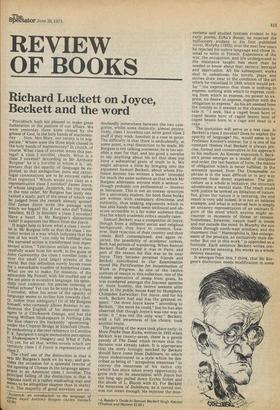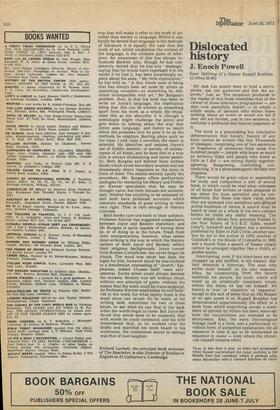REVIEW OF BOOKS
Richard Luckett on Joyce, Beckett and the word
" Providinch hath bin pleased to make great halteration in the pasture of our affairs. We were yesterday three kiple chined by the grease of God, in the holy bands of mattermoney. ... Now, Mrs Mary, our satiety is to supparate." Where were the three kiple chined in the holy bands of mattermoney? In crutch, of course. What class of novelist wrote this passage? A class 2 novelist, clearly. What is a class 2 novelist? According to Mr Anthony Burgess he is a novelist to whom it is "important that the opacity of language be exploited, so that ambiguities, puns and centrifugal connotations are to be enjoyed rather than regretted." Whom would you class as a representative class 2 novelist? James Joyce, of whose language, Joysprick, the rite words in the rote order, Mr Burgess has lately descanted a study, part of the tenor of which can be judged from the remark already quoted: Did James Joyce write the passage with which we began? No. If not who did? Tobias Smollett, M.D. Is Smollett a class 2 novelist? Have a heart. Is Mr Burgess's distinction valid? It separates the Mann from the Joyce.
It might help to know what a class 1 novelist is. Mr Burgess tells us that the class 1 novelist writes in a way which indicates that the aim of his work "can only be fulfilled when the narrated action is transformed into represented action." Television serials can be successfully made from his work; in the guise of John Galsworthy the class 1 novelist lords it over the small (and large) screens of the world. But this definition surely leaves room for a remarkable number of borderline cases. What are we to make, for instance, of the admirable Mr Powell, with his studied use of the set-piece in evocative language, his splendidly taut cadences, his precise ordering of verbal echoes? Yet can he be said to be a class 2 novelist, when his sense of the opacity of language seems to incline him towards clarity, rather than ambiguity? Or of Mr Burgess himself, who certainly allows Russian to undermine the English of his depraved teenagers in A Clockwork Orange, and has the Young William Shakespeare in Nothing Like the Sun observe the backeddy ' spureoning ' under the Clopton Bridge at Stratford (thereby embodying a discreet reference to Caroline F. E. Spurgeon's single memorable perception in Shakespeare's Imagery and What it Tells Lis) yet, for all that, writes novels which are certainly class 1 if Joyce is representative of class 2.
The chief use of the distinction is that it sts Mr Burgess's book on its way, and pro vides the occasion for a splendid rewrite of
the opening of Ulysses in the language appropriate to an American class 1 novelist. The principal failing of the distinction is that It ir.nposes itself in a rather misleading way and seems to be altogether sharper than in reality *it is. The majority of good novelists are un 4,JoYsprich: an introduction to the language of dcnnes Joyce Anthony Burgess (Andre Deutsch
doubtedly somewhere between the two categories, whilst some distinctly, almost pejoratively, class 1 novelists can write good class 2 stuff if they wish. Smollett is a case in point. The difficulty is that there is undoubtedly, at some point, a real distinction to be made. Mr Burgess is not talking nonsense; he is too sensible a man for that, and too good a novelist to say anything about his art that does not have a substantial grain of truth in it. We might advance a little by bringing into the argument Samuel Beckett, about whom Professor Kenner has written a books intended for much the same audience as that which Mr Burgess addresses; anyone with a serious — though probably not professional — interest in literature. This is not an uneasy synonym for a university student, for both these books are written with exemplary directness and authority, thus making arguments which in less able hands would seem technical and obscure accessible to a far wider audience than that for which academic critics usually cater.
Samuel Beckett was a compatriot of Joyce, though from a different social and religious background; they have in common, however, their rejection of their country and their creeds. Both contemplated, and again rejected, the possibility of academic careers. Both had periods of wandering. When Samuel Beckett finally settled it was in Paris, and part of the reason for this was to be near Joyce. They became personal friends and Beckett contributed to Our Examination round His Factification for Incamination of Work in Progress. As one of the twelve authors of essays in this collection, one of the chosen seperators of sheep from goats, he was numbered amongst the Joycean apostles or, more humbly, the twelve seekers after drink in the public house kept by Humphrey Chimpden Earwicker. For Joyce, and for his work, Beckett had and has the greatest respect: "the more Joyce knew" according to Beckett, " the more he could," but he has also observed that though Joyce's was one way to write, it "was not the only way." Beckett, with a full awareness of his choice, took another route.
The parting of the ways took place early: in More Pricks than Kicks, written in 1933 when Beckett was twenty-seven, there is a gentle parody of The Dead which reveals that the decision was already taken. It is appropriate that the story lovingly mocked by Beckett should have come from Dubliners, in which
Joyce endeavoured in a style which he described as being of "scrupulous meanness " to convey the meanness of his native city (which has since taken every opportunity to grow rich on its association with Joyce but
not long ago pulled down Eccles Street and the abode of L. Bloom with it). For Beckett the meanness of Dubliners, as it turned out, was not mean enough. He rejected the man nerisms and studied lyricism evident in his early poems, Echo's Bones; he rejected the buffoonery evident in his first published novel, Murphy (1935); over the next few years he rejected his native language and chose in. stead to write in French. Experience of the war, the occupation, and life underground in the resistance taught him more than he needed to know about fear, secrecy, betrayal and deprivation. All his subsequent works deal in nakedness; his novels, plays and stories draw near to the condition of the art which he visualised in 1949, which would prefer " the expression that there is nothing to express, nothing with which to express, nothing from which to express, no power to express, no desire to express, together with the obligation to express." As his art seemed from the outside so it seemed to the characters inside it: " I seek, like a caged beast born of caged beasts born of caged beasts born of caged beasts born in a cage and dead in a cage ..."
The quotation will serve as a test case. Is Beckett a class 2 novelist? Does he exploit the opacity of language? No, would seem to be Professor Kenner's answer, for it is one of his constant themes that Beckett is always precise, formal and conservative in his approach to his medium. As Kenner expounds it, Beckett's prose emerges as a model of discipline and order, the last bastion of form, the matrix of obligation which is never fulfilled. In the sentence quoted, from The Unnamable no phrase is in the least difficult or in any way removed from direct expression. The procedure as a whole is imitative; the structure adumbrates a mental state. The result could with justice be termed an imitation of nature, but, given the nature it is imitating, the end result is very odd indeed. It is not an isolated example, and what is achieved here is simply an uncanny representation of an ostinato figure of the mind which anyone might encounter in moments of illness or tension. Sometimes, however, nature itself is inside and not outside the mind. In Murphy the sun
shines through north-west windows, and the statement that" Haemophilia is, like enlargement of the prostate, an exclusively male disorder. But not in this work "is appended as a footnote. Each sentence Beckett writes con veys a precise meaning. His works as a whole destroy meaning.
It emerges from this, I think, that Mr Burgess's distinction needs modification in some way that will make it refer to the work of art rather than merely to language. Whilst it can hardly be denied that language is the medium of literature it is equally the case that the work of art, which establishes the context of the language, is the ultimate point of reference. An awareness of this has always in fluenced Beckett who, though he has con sistently denied that he has any ' message,' saying that he would have expressed it in his works if he had it, has been surprisingly ex plicit about his aims. " My little exploration," he has told us, " is that whole zone of being that has always been set aside by artists as something unusable—as something by definition incompatible with art." Mr Burgess's problem, then, is that his brief has been to write on Joyce's language, the implication being that this can be treated as something apart from his work as a whole. He recog nises this as the absurdity it is (though a semiologist might challenge the point) and gets down to talking about the way that Joyce uses language, and hence as much about the purposes that he puts it to as the methods he employs. Barring ploys such as the class 1 and class 2 novelists the result is splendid. He identifies and isolates Joyce's use of Dublin demotic, of parody, of onomatopeia of all kinds, and he does this in a way that is always illuminating and never pedantic. Both Burgess and Kenner have written books which avoid secondary sources and are shamelessly direct responses to the texts in front of them. The results entirely justify the procedure; Mr. Burgess offers perfunctory apologies for mislaying his library and Professor Kenner speculates that he may be thought naive, but their excuses are unneces sary. Neither has anything to be ashamed of, and both have produced accounts which maintain standards of good writing in their own right. That is rare enough in literary criticism.
Both books turn one back to their subjects. Professor Kenner has suggested comparisons between Joyce and Beckett elsewhere, and Mr Burgess is quite capable of having done so, or of doing so in the future. Fresh from their interpretations, however, what seems most striking is the way in which the literary careers of both Joyce and Beckett reflect their religious backgrounds. Joyce turned from Roman Catholicism, but never forgot its rituals. The word was never less than the logos for him, however much he was inclined to a Smollettian misreading of 'church.' Epiphanies, indeed Ulysses itself, were sacramental. Eccles street could always become the ecclesia. Beckett was left without ritual, without any principle of game, without the notion that the word could be transcendental. As Professor Kenner emphasises he still believes in the word, for what reality there is the word alone can reveal. So he waits, at his writing desk, sometimes for two or three hours, to see what he can find in the dark when the words begin to come. But Joyce believed that words were to be mastered, that with, words he could command, and his wife remembered that, as he worked over his drafts and searched his word hoard in his workroom, the commonest sound to emerge was that of loud laughter.
Richard Luckett, the principal book reviewer of The Spectator, is also Director of Studies in English at St Catherine's, Cambridge



































 Previous page
Previous page